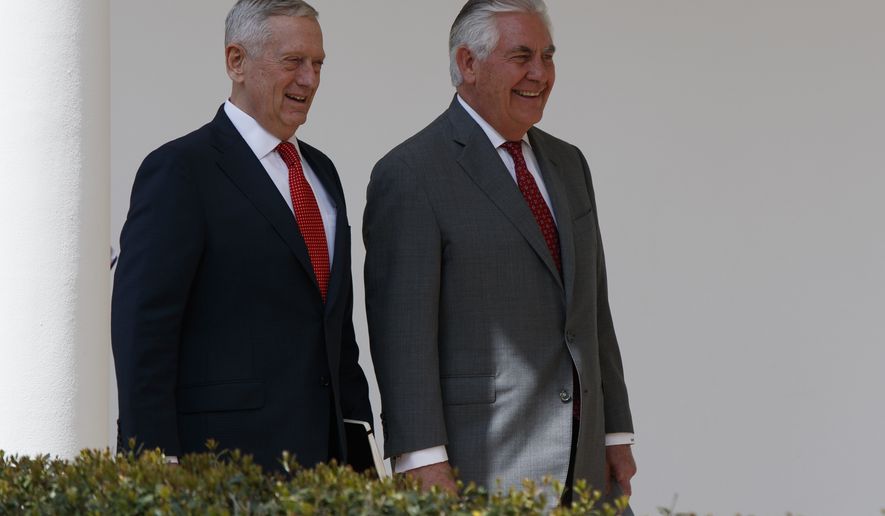OPINION:
On paper, NATO is an imposing institution — one of the world’s oldest and largest collective defense alliances. On the ground, its strength hinges on a single question: Will its 28 signatory nations actually spend blood and treasure to honor their pledge of collective defense in time of war? No one will know until the dread moment of truth arrives. With Russia more menacing than ever, it’s gut-check time for NATO.
U.S. Secretary of State Rex Tillerson’s late decision to attend the recent NATO conference in Brussels was a galvanizing moment. Striking a reassuring tone, Mr. Tillerson reaffirmed America’s commitment to the alliance. In particular, he pledged the United States would stand by its refusal to recognize the legitimacy of Russia’s 2014 incursion into Ukraine, and keep U.S. troops in Eastern European nations unnerved by Moscow’s aggression.
That’s a long way from Donald Trump’s campaign suggestion that NATO might be “obsolete” for its inability to deal forcefully with global terrorism. A campaign catch phrase to be sure, but it was useful as an elbow in the ribs meant to trigger soul-searching within a body that lost its edge after the end of the Cold War.
The secretary of state reminded the ministers of the president’s pointed criticism of deadbeat states that don’t pay their dues. “As President Trump has made clear, it is no longer sustainable for the United States to maintain a disproportionate share of NATO’s defense expenditures,” Mr. Tillerson said. “Allies must increase defense spending.”
Mr. Trump’s arm-twisting has made some converts already. France and Turkey are close to joining Greece, Estonia, Britain, Poland and the United States with promises to devote at least 2 percent of their gross domestic product on defense by 2024. Other NATO nations are looking between the sofa cushions for spare change. Germany, exploiting the unspoken wariness of nearly everyone of Germans in arms, grumbles about the dues.
In recent years, the alliance has picked up new members from Central and Eastern Europe, leading Moscow to growl that NATO is poaching in its neighborhood. Ukraine’s dalliance with NATO contributed to Russian President Vladimir Putin’s decision to occupy Eastern Ukraine, effectively blunting Ukraine’s quest for ties with the West. Baltic states Estonia, Latvia and Lithuania fear the same rough treatment. A U.S. Senate bill backing NATO membership for Montenegro, a tiny splinter of the former Soviet-ruled Yugoslavia, sits on Mr. Trump’s desk now.
NATO was created as a necessary barrier against an expansionist Soviet Union, and Russia’s rekindled aggression gives new relevance to the Reagan doctrine of peace through strength. When Mr. Tillerson visits Moscow later this month, he can gauge the depth of Mr. Putin’s frown at Mr. Trump’s efforts to awaken Europe to its obligations. When President Trump attends the upcoming NATO summit on May 25, he can smell for himself the suspicion of Russian mischief that continues to hang over the late U.S. presidential election season.
Tough times are what allies are for, and better to mix it up with friends than play Russian roulette with adversaries. As Benjamin Franklin reminded his fellows, as they signed the Declaration of Independence, “We must, indeed, all hang together or, most assuredly, we shall all hang separately.” Words to live by, now as then.




Please read our comment policy before commenting.